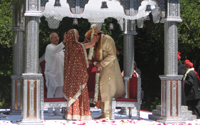From the Kitchen #2
 It’s winter, according to the Australian calendar. In many parts of the world, however, winter starts on the 21st – the time of the equinox, a reminder of the way people used to mark the turning of important cycles.
It’s winter, according to the Australian calendar. In many parts of the world, however, winter starts on the 21st – the time of the equinox, a reminder of the way people used to mark the turning of important cycles.
We have lost much of our connection with the cosmic and global ebbs and flows which marked the lives of our ancestors. We now respond to more mundane markers: commercial cycles, the ‘founding’ of a nation (though most people do not know what we are actually celebrating), the birthday of a monarch (though not on her birthday), the birth and death of a prophet upon whose life a religion has been based (though, again, not on the true days).
The observance of seasonal and astronomical cycles gave meaning to the lives of people all over the globe for thousands of years. ‘Meaning’ is the important word. We might dismiss this as superstition and not based on any verifiable science. But how much of our current life is governed by verifiable science? Politics? Economics? Religion? Sport? Psychiatry?
Where science is truly applied, huge advances are made, at an almost breathtaking rate. But how important is much of this to meaning in our lives? Would our lives have less meaning in the absence of modern information technology, communications technology or medical technology? How do any of these inform our beliefs and enrich our lives?
Most people’s lives in this society are governed by what is broadcast through the media and over social networks, and the prejudices of family and friends; and by the pontifications of ‘experts’.
Most economic experts failed to predict the global financial fiasco; climate experts continually fail to convince political experts that we need to urgently and radically change our behaviour. In any law court or judicial enquiry, each side can find experts in any field who will testify with opposing expertise.
We note the changing seasons with scant regard. We insist on wearing inadequate clothing in winter and compensate by turning up our heaters. We counter summer’s heat by refrigerating offices and shops to the level that we are obliged to carry a jumper.
Personal rites of passage have also largely disappeared or been robbed of meaning. We do celebrate births and mark deaths, but we rarely celebrate the latter. We also celebrate people’s unions and birthdays. However, with a few exceptions, these are not regarded as rites of passage.
Certain birthdays were traditionally regarded as significant in many cultures, because they truly marked a change – these were often based on a seven-year cycle. When the age of adulthood in this country was dropped to eighteen years, we lost the last of these.
The age of seven used to be the time to start schooling. It was recognised that this was the time when a young person’s brain was ready to commence formal instruction. For a host of ‘scientific’ and practical reasons, we have pushed this forward to age five, or even four.
Fourteen was recognised as the beginning of sexual development in many cultures. It was often marked by special ceremonies and initiations, aimed at impressing its importance on young people.
The end of the third cycle came at twenty-one, considered the age at which an individual could be expected to make their way in the world, independently of their parents. This was sometimes symbolised by the handing over of a key or other symbolic object.
And twenty-eight? Some societies saw this as the closing of the cycle, a time of spiritual renewal and a true coming into adulthood. In some cultures (even recently in some European countries) a person could not get married or enter into certain other important contracts before this age, without parental consent. Perhaps the modern trend in Australia for children to hang around the parental home until close to this age is an indication that this idea may not have been wrong.
So what of the seasons? Whether the first or twenty-first of June, that’s when winter starts. It seems irrelevant that we may have had snow two weeks earlier, or that we have a spate of warm days closer to July. We are obsessed with statistics and figures (the magic spells of the experts): the same temperature may be below average on the last day of May and above average on the first day of June.
Let us go back to unchanging, cosmic cycles to mark the seasons and the other affairs of humankind – it would make as much sense.
© 2009 Daan Spijer
 CLICK HERE to download a formatted PDF of the above post
CLICK HERE to download a formatted PDF of the above post
 See more of Daan Spijer’s writing and his photos at Seventh House Communications
See more of Daan Spijer’s writing and his photos at Seventh House Communications